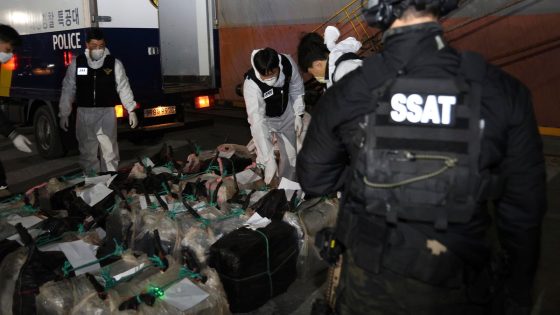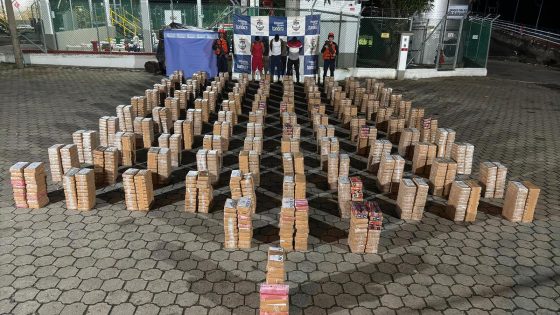On April 2, 2025, a significant event unfolded at a bustling east coast port in South Korea, marking a watershed moment in the nation’s battle against drug trafficking. The Korea Coast Guard, empowered by intelligence from U.S. agencies following months of covert operations and vigilance, executed a carefully coordinated drug bust aboard a Norwegian-flagged ship. What authorities discovered was staggering—a hidden stash of approximately two tons of pure cocaine, the largest seizure in South Korean history.
- South Korea seizes two tons of cocaine.
- Discovery linked to U.S. intelligence agencies.
- Operations involved 90 officers and drug dogs.
- Estimated street value of seized drugs: $697 million.
- Investigation into international drug trafficking underway.
- South Korea has low drug use rates.
As the vessel docked under the watchful eyes of 90 officers and their two canine companions trained specifically for drug detection, a sense of urgency filled the air. The operation had been meticulously planned, triggered by intelligence reported by the FBI and Homeland Security Investigations, which alerted local authorities to the ship’s suspect cargo. According to a spokesman from the Korea Coast Guard, “The operation was crucial. We had to act before the drugs reached the streets.”
When the team boarded the ship, the meticulous search honed in on a hidden compartment cleverly concealed behind the engine room—an ingenious spot that might have easily escaped notice. “Finding that compartment was like uncovering a hidden world of crime,” remarked one officer, who described the moment with a mix of triumph and disbelief. The 56 bags of cocaine, each weighing between 30 to 40 kilograms, were discovered tightly packed within, showcasing the lengths to which traffickers would go to evade capture.
The haul is not just another statistic; it equates to a staggering estimated street value of $697 million, underscoring the gravity of the crime. A customs official highlighted the significance by stating, “This seizure is about five times larger than the previous record we had, which was 404 kilograms of methamphetamine.” Such staggering figures reveal not just the scale of the operation but also the potential threat to South Korean society, which has historically enjoyed low rates of drug use due to stringent laws and societal stigmas.
As investigations continued, authorities shifted their focus to the ship’s captain and crew. They are now the subjects of an intense inquiry probing into the origins of the cargo and its intended destination. Conversations among investigators hinted at possible connections to notorious international drug trafficking syndicates, prompting the Coast Guard to deepen their collaboration with U.S. counterparts.
In a global context, this seizure is part of a larger, alarming trend of escalating drug trafficking incidents. Just a week before this bust, Portuguese authorities had announced the confiscation of nearly 6.5 tons of cocaine from a semi-submersible vessel off the Azores—a method that showcases the evolving tactics of traffickers. Furthermore, that same month, divers in Poland had recovered over 220 pounds of cocaine from the Baltic Sea, illustrating that this fight against drug smuggling is a pressing issue faced by nations worldwide.
As this complex case unfolds, the Korea Coast Guard remains committed, with ongoing forensic examinations to verify the drug’s authenticity and linkages to possible drug cartels. With every bit of evidence being scrutinized, and cooperation with U.S. authorities expanding, the next moves are crucial—not just for the current investigation but for setting a precedent in global narcotics enforcement.
This historic seizure resonates deeply within South Korea’s public consciousness, raising questions about the future of drug usage and trafficking in a country known for its stringent policies. As authorities continue their pursuit of answers, they hope not only to curb the flow of drugs into their society but to send a clear message to those in the shadows: the fight against drug trafficking is far from over.
































